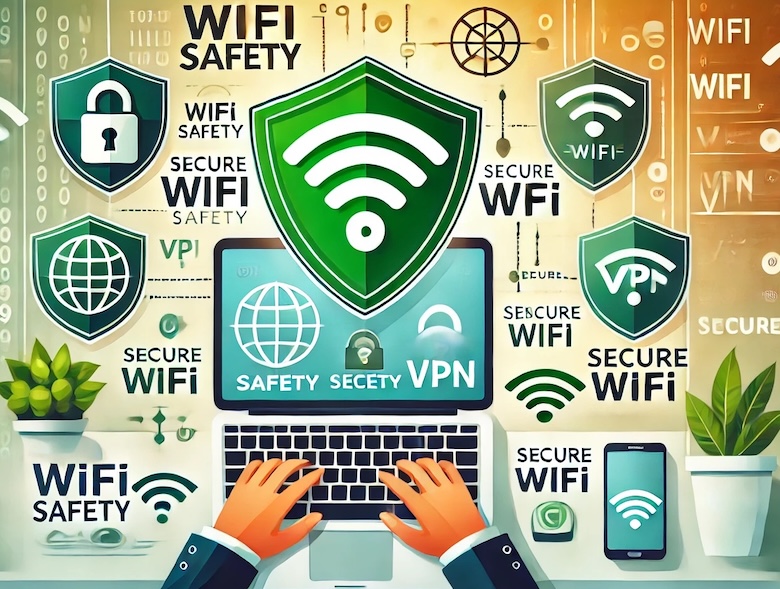Why Public WiFi Can Be Dangerous and How to Stay Safe

When you need to connect to the internet Using public WiFi it can feel like finding water in the desert. Easy and free! But, is it safe? Some people know how to get benefits from Public WiFi in an illegal way. We will talk about risks and safety tips in this article.
The Dangers of Public WiFi
Public WiFi networks are often not secure. That means others using the same network can access your activities. Some people use it to steal information or infect your device. Here are the list of things that may happen when you connect to Public WiFi:
Losing Sensitive Information
It’s like being in a crowded room where everyone can see your screen when you connect to public WiFi. If you log into accounts or enter sensitive details, someone might capture this information.
The Trap: Fake Wi-Fi Networks
You may find network names like “Coffee Shop Wi-Fi” that will seem very real, but they are just trap to monitor your online activity. Once connected, you may become very vulnerable.
Virus and Malware
Some public networks have hidden threats. They can then infect your device with virus and malware. We all know the motive of such infection, stealing data, locking computers, and monitoring activity are just few of the vulnerabilities that it can cause.
Your Private Conversations Aren’t Safe
Whether you are sending emails or talking to someone, you always risk interception when connection to public Wi-Fi. If the network isn’t secure, someone could read or listen in.
Your Device Could Be Controlled
Hackers can take over your device to perform harmful activities. They can then send spam or phishing emails, steal information, make calls etc.. Once they gain control, it may be too late to understand what went wrong.

How to Stay Safe on Public WiFi
I understand that it’s not possible to simply stop using Public WiFi. Let’s learn How to use these networks safely.
- Avoid Logging into Sensitive Accounts: Any websites that require to type of secure information, e.g. Bank, Card Details, Social Security Number, etc., you should stop browsing it. Wait until you’re on a secure network.
- Look for Secure Websites: Before entering any information, check if the website starts with HTTPS. This means the site encrypts your data.
- Turn Off Sharing Options: Most devices have sharing features that let others access your files or connect to your device. Turn these features off when using public WiFi.
- Disconnect After Use: After using public WiFi, disconnect and make your device forget the network. This stops it from reconnecting automatically.
- Use VPN: A VPN provides A secure way for your data to be kept private even on public networks. You should consider getting a reliable service If you don’t have one.
- Deactivate the Auto-Connect: Often Devices will connect automatically to the available WiFi networks. Make sure you disable this feature in your settings.
- Make sure Your Device is up to date: Security Updates address vulnerabilities that could be exploited by hackers. Always keep your operating system and apps up to date.
- Passwords and Two-Step Verification are important: The password is the key to a secure account. A two-step verification adds an additional layer of security.
- Mobile Data for Sensitive Tasks: When you log in to a bank account or shop online, switch to mobile data. It’s safer than the public WiFi.
- Be aware of Pop-ups and Links: If you are connected to public WiFi Avoid clicking on pop-ups or links They might lead to harmful websites or install malware.
How do I Spot a Fake WiFi
Many Hackers create fake WiFi networks to steal information from the public. Learn to identify these networks and avoid falling into their traps.
- Unfamiliar Names: Do not connect If the network name doesn’t match the location or sounds odd.
- Password is not Required: Often Open networks without passwords are dangerous.
- The demand of Personal Information: It may not be safe to connect to a network If they ask for your name email or other details.
How Do You recover from a hack?
When suspecting a theft of your information act immediately. So you can reduce the damage and get back to your control of the situation.
- Change All Your Passwords
Update the passwords for your email, social media, and any other accounts you’ve used recently. - Notify Your Bank
Contact your bank if you’ve accessed online banking or entered card details. They can help secure your account. - Scan Your Device
Use antivirus software to check your device for harmful files. Remove any threats immediately. - Monitor Your Accounts
Keep a close eye on your accounts for unusual activity. Report anything suspicious right away.
Some More Tips
It is not very complicated to keep yourself safe while using public Wi-Fi. Below you will find some simple tips:
Use Apps with Built-In Security: Many apps now offer extra security features. Check your app settings to enable these.
Keep Bluetooth and File Sharing Off: These features can make your device more vulnerable to attacks.
Stick to Trusted Networks: Use WiFi from known providers or places you trust.
Log Out After Use: Don’t stay logged in when using public WiFi.
Why Should You Be Careful?
WiFi can make life easier but it’s important to understand the risks. Think about it as if you left your front door open. Everyone can go inside if you don’t take steps to lock it. You can use public networks safely without putting your personal information at risk by following these tips.
Next time you are at the coffee shop or waiting at the airport, you should think about it before you connect. A little precaution is always good.